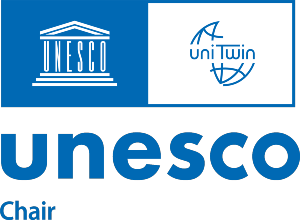UNESCO Chair

Professor John Canavan
Appointed in July 2024, Professor John Canavan is the UNESCO Chair in Children, Youth, and Civic Engagement. Professor Canavan, a Personal Professor in Political Science and Sociology, is the Director of the UNESCO Child and Family Research Centre (UCFRC), which he co-founded in 2007.
.png)
Watch the Inaugural Lecture marking the formal commencement of the appointment of Professor John Canavan as UNESCO Chair in Children, Youth, and Civic Engagement, University of Galway.
John’s career is defined by its focus on improving the lives of children, young people and their families through policy focused research and a sustained commitment to the education of professionals working with them. His research spans child protection and welfare, youth work, youth development, community development, educational disadvantage, and early years care and education. His teaching is orientated towards sociological perspectives and policy provision for children, youth and families, with an additional specialism in evaluation and programme planning. He has extensive experience in collaborative and interdisciplinary research partnerships, including with colleagues in the fields of education, health and psychology, both nationally and at international centres of excellence.
As Centre Director, he oversees a comprehensive work programme that adopts a forward looking approach to addressing complex and multifaceted societal challenges relevant to global priorities and the lived lives of children, youth and families
In his role as Chairholder, John brings extensive experience in theorising and planning system change in complex contexts, a focus on policy implementation and evaluation and a strong commitment to bridging research and policy for societal impact.
Pat Dolan, UNESCO Chair 2008-2024. In recognition of the significant contribution made by Professor Dolan during his sixteen year service, he has been appointed Professor Emeritus and Advisor.
About the UNESCO Chair Programme
The Chairs programme is part of the UNESCO University Education and Twinning Programme (UNITWIN) advancing research, training and programme development in all of UNESCO’s fields of competence. UNITWIN constitutes a vast network of interuniversity cooperation including over 1,000 educational institutions from 120 countries as part of which Chairs act as think tanks and bridge-builders between the academic world, civil society, local communities, research and policy-making. As part of the UNITWIN programme, Chairs align their work with UNESCO in support of the ideals of the Organisation to advance forward-looking research programmes that can contribute to addressing complex and multifaceted development issues. UNESCO Chairs teams contribute to exploration of emerging issues, the development of international normative instruments to the implementation of policy recommendations at the national level. They have a key role in bringing together partners in academia, civil society, local communities and policy-makers for project implementation and are valued for communicating the humanistic values of UNESCO through teaching activities.
Established in 2008, the Chair programme in Children, Youth and Civic Engagement at the University of Galway is delivered through the UNESCO Child and Family Research Centre. The work programme is renewed every four years based on a portfolio of research, teaching and outreach activities aligned with UNESCO’s strategic programme and objectives.
The 2025-2029 programme
The current programme, led by Chairholder Professor John Canavan, responds to UNESCO priorities in the Education and Youth sectors, UNESCO’s Medium Term Strategy for 2022-2029 and the 2030 Agenda for Sustainable Development. It builds on established collaborations with UNESCO colleagues alongside the expertise of the Chairholder in family support, system change, complexity and connecting research and policy.
Objectives:
- to enhance and further develop the existing Chair programme focusing on: Empathy/Social and Emotional Learning; Youth Mentoring; Alternative Education; and the Youth as Researchers (YAR) model.
- to develop a UNESCO position on family support as a policy paradigm that supports parents and wider family in meeting the needs of excluded children and young people in educational and inter-sectoral settings; and
- to embed policy and systems change as a cross-cutting theme across all work programmes seeking more effective bridging of policy and research worlds for greater societal impact.
The 2025-2029 Work Programme encompasses five thematic work packages led by the Centre’s experienced team in the areas of youth empathy and civic engagement; youth mentoring; family support; youth engagement and participation; and alternative education. Recognising and respecting the specific mission of UNESCO and its partner organisations, the Chair is actively engaged in developing conceptual and practical linkages in the form of knowledge sharing and collaboration across research, policy and training and to leveraging interuniversity and intersectoral partnerships. In the face of emerging global challenges and a commitment to support UNESCO with research and other inputs, the plan will be responsive to unanticipated events and opportunities.

Members of the team launch the 2025-2029 Work Programme with the Chairs’ Programme Coordinator and a number of experts at UNESCO headquarters in Paris.







